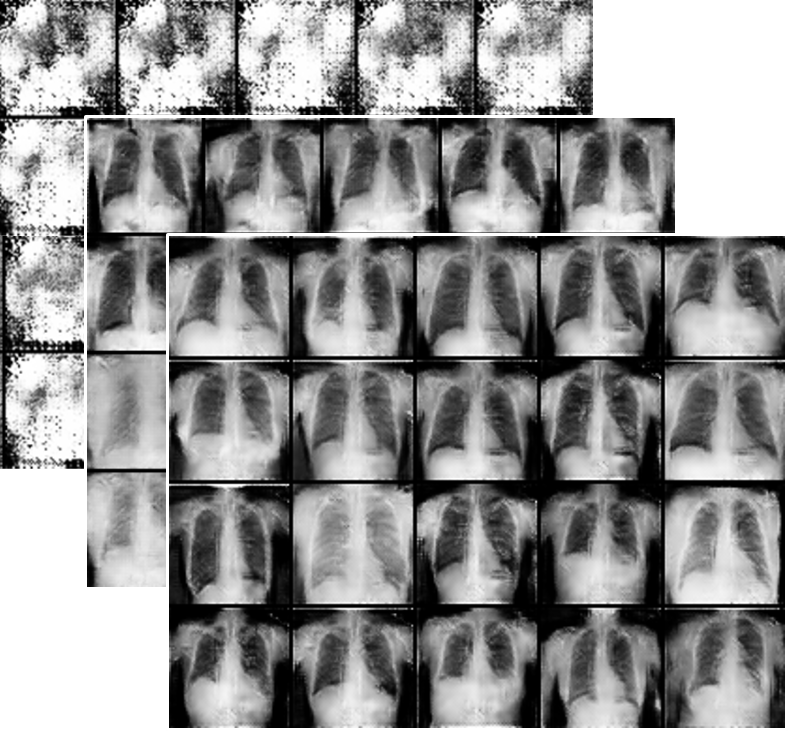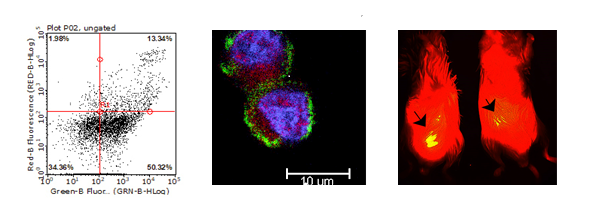Medical Information Sciences Researches
Structure-based Disease Analysis and Drug Discovery
Zenichiro Kato : MD, PhD
Research Area : Structural Medicine
We are establishing the new research filed "Structural medicine". This includes a protein structure analysis and a drug discovery using the molecular structure determined by atomic resolution. This sub-nanometer information let us understand the precise molecular mechanism of the diseases and let us create the new drugs at the same scale as the drug molecules.
Complex structure of IL-18, IL-18R α and IL-18R β
Analysis of the Function and Structure of Fc ε RI β Chain
Tomoyoshi Terada :MD, PhD
Research Area : Physiology, Allergology
Mast cells express a high-affinity IgE Fc receptor (Fc ε RI), and are involved in allergic diseases. Our research focuses on Fc ε RI β chain. β chain plays an important role in signal transduction of mast cells. So, effective control of β chain is important in controlling allergic reactions caused by mast cells.
Development of Computer-aided Diagnosis Systems
Daisuke Fukuoka : PhD
Research Area : Medical Image Processing, Software Developmen
Our research group focuses on the development of Computer-aided Diagnosis (CAD) systems for medical images used for image diagnosis. In recent years, image analysis using AI (Artificial Intelligence) has become one of the main research themes.

Research for Young Adults Health; International Comparative Study. Research for Diabetes and Lifestyle-related Diseases in Japanese Population.
Mayumi Yamamoto : MD, PhD, MBA
Research Area : Int. Med., Health Sciences, Endocrinology and Metabolism Health Promotion
Health promotion for young adults is an important issue on the development of national health care and reasonable regulation of national medical expenditure. Research for the analysis of mental and physical health problems in university students are conducting and international comparative studies are also progressing.
Gifu Diabetes Study, which was conducted with randomly selected from the residential registry, data are analyzing to elucidate the trend of lifestyle-related disease and diabetes in Japanese population.
Mathematical Modelling and Analysis of Dynamical Processes in Biology
Takashi Ichinomiya : PhD
Research Area : Applied mathematics, Network theory, Bioinformatics
Recently, the mathematical modelling has taken an important role in biological and medical research, such as the emergence and development of cancers, circadian rhythm of cells, and epidemics of infectious diseases. Our current concern is the modelling various biological processes using mathematics. The mathematical analysis of these models will give us important information on the understanding and treatment of various diseases.
Mental Health in University Students: Support for Individuals with Mental Disorders and/or Developmental Disabilities
Ryo Horita:PhD
Research Area:Clinical Psychology, Student Counseling, Mental Health, Support for Student with Disabilities
We are conducting research on mental health in university students using the Japanese version of an international standard scale called the Counselilng Center Assessment of Psychological Symptoms (CCPS).
We aim to establish effective methods and models of psychological support, educational support, and transitional support for individuals with mental disorders and/or developmental disabilities in collaboration with the government and local support organizations.
Research into Antibiotic Resistance and Pathological Significance of Resident Microbes
Kaori Tanaka :PhD
Research Area : Clinical Bacteriology, Anaerobic Microbiology
Resident microbes intimately interact with our bodies throughout our lifetimes. While they are an essential part of our health, they can also cause infectious diseases. Our research focuses on understanding antibiotic resistance and the pathological significance of these resident microbes, especially obligately anaerobes.

Search for Therapeutic Targets and New Drug Development for Allergic Diseases
Hiroyuki Tanaka :PhD
Hirotaka Yamashita :PhD
Research Area : Pharmacology, Immunology
We are investigating possible therapeutic targets and new drugs for allergic diseases (e.g., atopic dermatitis, asthma, and food allergies) and emphysema using animal models and cell systems. We are also studying the appropriate use of drugs in current clinical use. We welcome young researchers who are interested in drug discovery.
Electron microscopic image of a mite
Research on Interorgan Networks and Biohomeostasis
Eiichi Hinoi:PhD
Research Area:Integrated Pharmacology
Osteoblasts, responsible for bone formation, were recently revealed to be essential for various pathogenetic and physiological phenomena as well as for bone homeostasis. We are investigating the new intercellular (interorgan) networks between osteoblasts (bone tissue) and other cells (organs) across the body in order to elucidate various functions of osteoblasts.
Drug Discovery Based on Pathology and Diagnostics Findings
Chiemi Saigo : Phd
Research Area : Pathology, Diagnostic Pathology
We are conducting two drug discovery research projects based on pathology and diagnostics findings. We have applied for international patents based on the outcomes of both projects.
1. Use of a cancer metabolism inhibitor in combination with an autophagy inhibitor to manage soft tissue sarcoma. After the FDA granted "orphan drug" status to CPI613+Chloroquine, a phase I/II clinical trial (APOLLO613) examining the efficacy of the combination therapy for postoperative relapse of clear cell sarcoma was launched at multiple centers, including City of Hope and the Cleveland Clinic in the US. We continue our investigation with the aim of expanding indications of the combination therapy to other malignant tumors.
2. Development of therapeutic antibodies for colorectal cancer and mesothelioma. The figures below show that these therapeutic antibodies induced apoptosis in mesothelioma cells and inhibited tumor growth in a mouse model of intraperitoneal mesothelioma.

Understanding the Functions of Fatty Acids in Animal Development and Diseases
Shigeo Takashima :PhD
Research Area : Developmental Genetics
Our research aims to understand the relationship between fatty acid and animal development and diseases.To this end, we study human diseases with defective fatty acid metabolism focusing on how each fatty acid species affect the cellular behavior and the physiological functions. We also try developing the conventional method to analyze a wider range of fatty acid species by distinguishing their chemical structure.

Ultra-very-long-chain fatty acid with 44 carbons and 12 double bonds found in patient-derived fibroblasts

